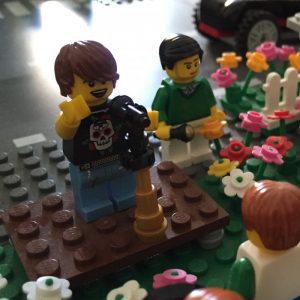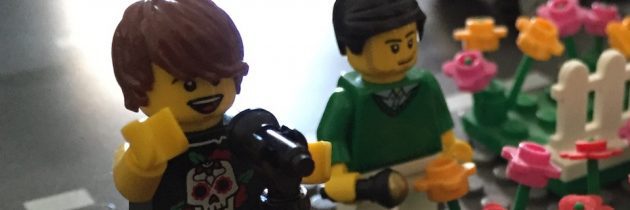Talking Verse Novels at GetLitBeacon
Last Sunday, I took a 90-minute train ride out of New York City and through the woods to Beacon, New York, where GetLitBeacon’s organizer, Julie Chibbaro, had invited me to speak. Although Julie was away at a conference that day, her husband and sometime writing collaborator JM Superville-Sovak, served as a gracious and capable host. After giving me a quick tour of the main street (I’ll have to return to see the contemporary art museum where he works), he brought me to the restaurant where the monthly literary salon takes place. I was scheduled to speak for 45 minutes, after which the GetLitBeacon regulars — including a 15-year-old poet and (unbeknown to me at the time) at least one editor and agent — would meet to read their work. I had given Julie three possible topics for my presentation: translation, the verse novel, and “my writing journey and the lesson of persistence.” Because of the number of poets in the group, she suggested I talk about verse novels.

These are my people, devoted to literature (and here, a poetry slam).
In fact, both JM and the audience members had questions for me, so I didn’t get to talk as much about verse novels as I’d planned. I’d written a fairly long outline, which would have taken the entire 45 minutes and probably bored everyone. In fact, I spoke a little about why I started writing verse novels after writing nine (not all of them published) complete novels in prose, then read the first poem from a middle grade work-in-progress. One of the audience questions touched on the difference in process between writing a verse novel and a more traditional prose novel.
Although verse novels have become popular recently for a variety of reasons, my own journey to writing them grew out of my characters’ experience and voice rather than any perceived advantage of “marketability.” As I told my audience in Beacon, a side character of my historical novel set during the Salazar dictatorship in Portugal organizes a clandestine poetry club to write heroic poems for her political prisoner boyfriend. In the course of writing them, though, her focus changes from honoring him to expressing herself in a society that seeks to silence her, in the same way that Xiomara does in Elizabeth Acevedo’s award-winning debut novel The Poet X. Although I’ve shelved that novel temporarily, I’m now writing from the point of view of a 12-year-old boy obsessed with punk rock and specifically The Clash, capturing the anger and criticism of society that characterized this seminal band of the Reagan-Thatcher era.
I told the audience that the verse novel requires a different approach to the scene, with white space taking the place of transitions and the scene itself consolidated to its “heart.” One starts with the emotion rather than the action, and while there may be dialogue (a challenge in the verse novel because speech doesn’t generally conform to the rhythm and meter of poetry), interior monologue is key, and “showing” involves word order, line breaks, imagery, metaphor, and sometimes concrete poetry in which the arrangement of words creates a visual image. For instance, in Cordelia Jensen’s Skyscraping, another major influence on my work, concrete poetry in the image of stars and planets reinforces the central metaphor of the cosmos as Mira comes to terms with her father’s dying from AIDS and her own place in her family, school, and community.
In reading Skyscraping, The Poet X, and other verse novels, speaking with authors, and reading their interviews, I’ve come to see the verse novel as built on the imagery and/or musicality of poetry — some leaning toward the visual, others toward the aural — but driven by the story’s need for forward motion. In this respect, I’ve learned a lot from my work as a translator, working with Claudia Bedrick of Enchanted Lion to select books to translate. Several times, I brought her exquisitely illustrated poetry that she’s rejected because the text felt static, the illustrations decorative. As one of my professors at VCFA, Martine Leavitt, said in reference to her acclaimed verse novel My Book of Life by Angel, a verse novel has to work both as poetry and as story. As a result, in developing my verse novels, I’ve outlined the principal story events and identified emotional turning points related to those events. At that point, I write the poems. I expect in the process of revision that poems will be rewritten, moved around, or deleted in favor of other poems. That’s already happened, for I tend to revise as I go.
As I write poems for the verse novel, I write other poems for my the Friday Poetry Club that I joined with other VCFA students, faculty, and alumni. I plan to submit some of them to other journals (though I managed to miss a key deadline for one — oops!), publish others on this blog, and use some as teasers for my newest prose novel, as I’ve written poems as spinoffs of several scenes already and plan to write more. For me, this is an exciting new direction, and I’m ready to see where it takes me! And thank you to Julie, JM, and all the kind folks at GetLitBeacon who welcomed me to their community.
I promised everyone that I’d add a bibliography of middle grade and YA verse novels that I’ve appreciated and that have influenced my work. Like mine, many of these titles are historical fiction and I’ve marked them with an *.
For MG readers:
Alexander, Kwame. The Crossover (and other titles for both MG and YA)
* Brown, Skila. Caminar
* Engle, Margarita. Silver People (along with biography and memoir for both MG and YA)
* Hesse, Karen. Out of the Dust
* Hood, Susan. Lifeboat 12
* Lai, Thanhha. Inside Out and Back Again
* Rose, Caroline Starr. May B
Woodson, Jacqueline. Brown Girl Dreaming (memoir)
For YA readers:
Acevedo, Elizabeth. The Poet X
* Crowder, Melanie. Audacity
* Crowe, Chris. Death Coming Up the Hill
Hopkins, Ellen. Crank (along with the rest of the series and many other titles)
Jensen, Cordelia. * Skyscraping and The Way the Light Bends
Leavitt, Martine. My Book of Life by Angel
* McCullough, Joy. Blood Water Paint
Venkatraman, Padma. A Time to Dance
* Walrath, Dana. Like Water on Stone
* Wilson, Kip. White Rose







I’m so excited to learn that you’re working on a verse novel. It’s a format that I really enjoy. I’ve read quite a few on your list, but am happy to add some of the titles to my TBR list. Thanks and I can’t wait to read your poetry. 🙂
Thank you, Crystal! I’m in fact working on two verse novels — one middle grade and one YA. Both historical fiction, but set in different times and places.
Awesome post, Lyn. Interestingly enough, a few days ago, I listened to a podcast with Kwame Alexander. He discussed his imprint–Versify. So I’m glad to hear that you’re working on two verse novels. ????
Thank you! I found him inspiring when he came to town with his initial group of authors on the Rock Star Bus. And I saw where The Undefeated has make the National Book Award longlist.